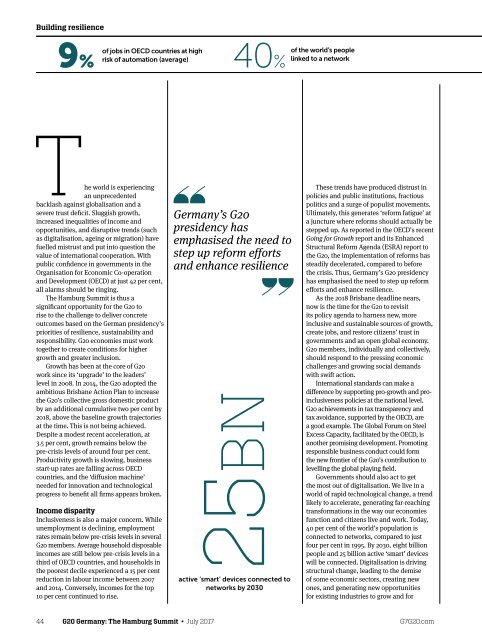G20-Germany-Hamburg-2017
mo.rami@trmg.co.uk
mo.rami@trmg.co.uk
You also want an ePaper? Increase the reach of your titles
YUMPU automatically turns print PDFs into web optimized ePapers that Google loves.
Building resilience<br />
of jobs in OECD countries at high<br />
9% 40%<br />
risk of automation (average)<br />
of the world’s people<br />
linked to a network<br />
The world is experiencing<br />
an unprecedented<br />
backlash against globalisation and a<br />
severe trust deficit. Sluggish growth,<br />
increased inequalities of income and<br />
opportunities, and disruptive trends (such<br />
as digitalisation, ageing or migration) have<br />
fuelled mistrust and put into question the<br />
value of international cooperation. With<br />
public confidence in governments in the<br />
Organisation for Economic Co-operation<br />
and Development (OECD) at just 42 per cent,<br />
all alarms should be ringing.<br />
The <strong>Hamburg</strong> Summit is thus a<br />
significant opportunity for the <strong>G20</strong> to<br />
rise to the challenge to deliver concrete<br />
outcomes based on the German presidency’s<br />
priorities of resilience, sustainability and<br />
responsibility. <strong>G20</strong> economies must work<br />
together to create conditions for higher<br />
growth and greater inclusion.<br />
Growth has been at the core of <strong>G20</strong><br />
work since its ‘upgrade’ to the leaders’<br />
level in 2008. In 2014, the <strong>G20</strong> adopted the<br />
ambitious Brisbane Action Plan to increase<br />
the <strong>G20</strong>’s collective gross domestic product<br />
by an additional cumulative two per cent by<br />
2018, above the baseline growth trajectories<br />
at the time. This is not being achieved.<br />
Despite a modest recent acceleration, at<br />
3.5 per cent, growth remains below the<br />
pre-crisis levels of around four per cent.<br />
Productivity growth is slowing, business<br />
start-up rates are falling across OECD<br />
countries, and the ‘diffusion machine’<br />
needed for innovation and technological<br />
progress to benefit all firms appears broken.<br />
Income disparity<br />
Inclusiveness is also a major concern. While<br />
unemployment is declining, employment<br />
rates remain below pre-crisis levels in several<br />
<strong>G20</strong> members. Average household disposable<br />
incomes are still below pre-crisis levels in a<br />
third of OECD countries, and households in<br />
the poorest decile experienced a 15 per cent<br />
reduction in labour income between 2007<br />
and 2014. Conversely, incomes for the top<br />
10 per cent continued to rise.<br />
<strong>Germany</strong>’s <strong>G20</strong><br />
presidency has<br />
emphasised the need to<br />
step up reform efforts<br />
and enhance resilience<br />
25BN<br />
active ‘smart’ devices connected to<br />
networks by 2030<br />
These trends have produced distrust in<br />
policies and public institutions, fractious<br />
politics and a surge of populist movements.<br />
Ultimately, this generates ‘reform fatigue’ at<br />
a juncture where reforms should actually be<br />
stepped up. As reported in the OECD’s recent<br />
Going for Growth report and its Enhanced<br />
Structural Reform Agenda (ESRA) report to<br />
the <strong>G20</strong>, the implementation of reforms has<br />
steadily decelerated, compared to before<br />
the crisis. Thus, <strong>Germany</strong>’s <strong>G20</strong> presidency<br />
has emphasised the need to step up reform<br />
efforts and enhance resilience.<br />
As the 2018 Brisbane deadline nears,<br />
now is the time for the <strong>G20</strong> to revisit<br />
its policy agenda to harness new, more<br />
inclusive and sustainable sources of growth,<br />
create jobs, and restore citizens’ trust in<br />
governments and an open global economy.<br />
<strong>G20</strong> members, individually and collectively,<br />
should respond to the pressing economic<br />
challenges and growing social demands<br />
with swift action.<br />
International standards can make a<br />
difference by supporting pro-growth and proinclusiveness<br />
policies at the national level.<br />
<strong>G20</strong> achievements in tax transparency and<br />
tax avoidance, supported by the OECD, are<br />
a good example. The Global Forum on Steel<br />
Excess Capacity, facilitated by the OECD, is<br />
another promising development. Promoting<br />
responsible business conduct could form<br />
the new frontier of the <strong>G20</strong>’s contribution to<br />
levelling the global playing field.<br />
Governments should also act to get<br />
the most out of digitalisation. We live in a<br />
world of rapid technological change, a trend<br />
likely to accelerate, generating far-reaching<br />
transformations in the way our economies<br />
function and citizens live and work. Today,<br />
40 per cent of the world’s population is<br />
connected to networks, compared to just<br />
four per cent in 1995. By 2030, eight billion<br />
people and 25 billion active ‘smart’ devices<br />
will be connected. Digitalisation is driving<br />
structural change, leading to the demise<br />
of some economic sectors, creating new<br />
ones, and generating new opportunities<br />
for existing industries to grow and for<br />
44 <strong>G20</strong> <strong>Germany</strong>: The <strong>Hamburg</strong> Summit • July <strong>2017</strong> G7<strong>G20</strong>.com
















